Skift Take
It will be interesting to see what derives from Zappos' entry into the hotel business, and how it chooses to brand it. Given its Amazon ownership and funding, CEO Hsieh's knack for disruption, and the company's overall commitment to customer service, we can expect something pretty unique.
At the Global Wellness Summit in Tyrol, Austria, Zappos, the Amazon-owned online footwear and clothing retailer announced it is contemplating a foray into a new business model: hotels.
Maggie Hsu, chief of staff to Zappos CEO Tony Hsieh, who made the announcement at the summit, told Skift, “I spoke about the fact that we’re considering going into hospitality but didn’t officially announce a Zappos hotel brand … We’re in the very early stages of brainstorming so I’d love to be back in touch in a few months when we’ve made more progress.”
This isn’t the first time Zappos has made an allusion to entering the hotel industry. As far back as June 2014, Hsieh made a comment, via Twitter, that the company could potentially have hotels, in a Twitter chat:
Q6: It’s June 2019. What does Zappos look like?
A6: No idea what Zappos will look like in 2019… Maybe Zappos Airlines or Zappos Hotel w/ service/culture/community focus? #insidezappos
In a profile piece published in The Washington Post in December 2015, Hsieh also hinted at the company’s first foray into a new field.
In his interview with The Post, Hsieh said that his unconventional decision to implement “holocracy” by eliminating bosses or managers from his company structure was driven by a desire to expand into new industries beyond e-commerce. With Hsu’s announcement at the Global Wellness Summit, that desire seems closer to becoming a reality.
The Downtown Project: A Test Pilot for Zappos Development?
In 2012, Hsieh launched the Downtown Project, an ambitious $350-million project aimed at revitalizing and transforming a derelict part of downtown Las Vegas into a new incubator of entrepreneurship, co-living, and co-working.
The project includes more than 300 different businesses, from shops and restaurants as well as two hotels: the Oasis at Gold Spike and Las Vegas Hostel. The Oasis at Gold Spike Hotel was newly renovated and reopened in 2014, and the Las Vegas Hostel was renovated and reopened in August 2015.
Zappos doesn’t directly own or operate the hotels that are part of the Downtown Project. A spokesperson for Downtown Project said “Zappos is in no way involved with the ownership or management of any of Downtown Project’s businesses, including hotels, and our pilots are not a precursor to anything that Zappos might do.”
Reception to the Downtown Project since its launch has been very mixed. In April, the Downtown Project’s CEO Mark Rowland resigned. Hsieh has also admitted the project is “a work in progress — like any startup.”
The community-driven foundation upon which the Downtown Project was conceived, however, could be a bit of a blueprint for how Zappos approaches its hotels in the future, given Hsieh’s earlier comments about community and Zappos hotels. And as Skift has noted before, co-living and co-working concepts could be the next big hospitality trend.
The New Age of Branded Hotels
Another noticeable trend in hospitality these days? New hotel brands being forged from existing brands outside the hotel space. Examples include: Equinox Hotels from the company known for its high-end gyms; West Elm Hotels from the company known for its home furnishings; Margaritaville Resorts from the company known for its line of restaurant-bars; and soon, Lagerfeld Hotels, brought to you by fashion designer Karl Lagerfeld of Chanel.
While it’s not clear whether the Zappos brand will be the branded name of Zappos’ new hotel venture, it is interesting that so many brands and businesses from outside the traditional hotel space are choosing to check into the hotel business.
Some of these transitions, for example, are a bit easier to understand. Take, for example, West Elm Hotels. Skift spoke with David Bowd, principal of West Elm Hotels, about the company’s decision to launch hotels using its brand.
“West Elm has such incredible natural design taste,” Bowd said. “It’s a very familiar and comfortable product for many millions of users all over the world. That made this a very natural step into hospitality. Over the years, there’s been a tendency for lifestyle and boutique hotels to combine with nightclubs, fashions, malls.” He added, “When you go into a West Elm store it feels like you’re in a neighborhood. We want you to have that same feeling when you check into a West Elm hotel.”
As Skift noted earlier this year, many boutique hoteliers are also looking to established brands to tell better stories with their lifestyle hotels.
Have a confidential tip for Skift? Get in touch
Photo credit: Zappos.com CEO Tony Hsieh. The Amazon-owned online shoe and clothing retailer recently announced it is planning to launch a hotel business. Silicon Prairie News/Malone & Company Photography / Flickr
